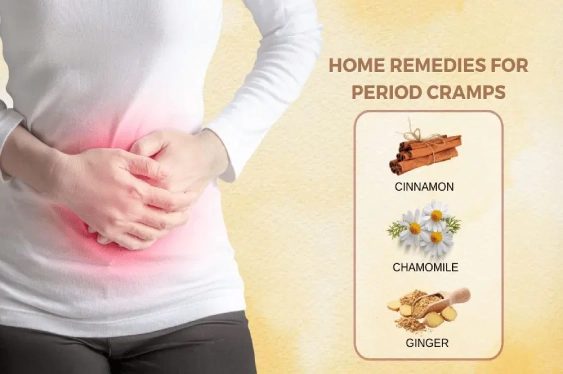
Menstrual cramps, also known as dysmenorrhea, are something most women experience every month. These cramps usually occur in the lower abdomen or back and can range from mild discomfort to intense pain. While painkillers are commonly used for relief, many women prefer natural and gentle alternatives to manage the pain. Fortunately, there are several home remedies for period cramps that can provide effective relief without side effects. These simple remedies help relax muscles, reduce inflammation, and improve overall comfort during menstruation.
Understanding Period Cramps
Before exploring natural remedies, it’s important to understand what causes period cramps. During menstruation, the uterus contracts to shed its lining. These contractions are triggered by hormone-like substances called prostaglandins. Higher levels of prostaglandins lead to stronger contractions and more pain. Other factors such as stress, dehydration, or lack of exercise can also make cramps worse.
For many women, cramps can interfere with daily activities, making it hard to focus, work, or even sleep. Thankfully, certain home remedies can reduce this discomfort and help you feel better naturally.
1. Applying Heat
Applying heat is one of the simplest and most effective ways to ease menstrual cramps. The warmth helps muscles in the uterus relax, which reduces pain and tension. You can use:
- A hot water bottle placed on your lower abdomen
- A heating pad set to a comfortable temperature
- A warm towel or heat patch
You can also take a warm bath to soothe your body. Heat improves blood flow and helps calm cramping muscles. Studies show that heat therapy can work just as effectively as painkillers for many women.
2. Drinking Herbal Teas
Certain herbal teas are known for their natural anti-inflammatory and muscle-relaxing properties. Sipping on a warm cup of herbal tea not only keeps you hydrated but also helps relieve cramps. Some of the best teas for menstrual relief include:
- Chamomile tea – reduces muscle spasms and promotes relaxation
- Ginger tea – eases pain and fights inflammation
- Peppermint tea – soothes the digestive system and reduces bloating
- Cinnamon tea – improves blood flow and reduces pain intensity
Drinking two to three cups of herbal tea daily during your period can provide noticeable relief and comfort.
3. Staying Hydrated
Dehydration can make period cramps worse. Drinking plenty of water throughout the day helps prevent bloating and muscle tightness. Aim for at least 8 to 10 glasses of water daily. Warm or hot water is especially helpful because it increases blood flow and relaxes cramped muscles.
If plain water feels boring, you can try adding lemon slices, cucumber, or mint leaves for flavor. Coconut water and herbal infusions are also great hydrating options. Avoid caffeine and alcohol, as they can dehydrate your body and increase discomfort.
4. Gentle Exercise and Stretching
When you’re in pain, exercise might be the last thing you want to do. However, light physical activity can actually help ease cramps. Exercise increases blood circulation and releases endorphins — natural chemicals that make you feel good and reduce pain.
Here are a few simple activities that can help:
- Walking – improves blood flow and reduces bloating
- Yoga – certain poses, like Child’s Pose, Cat-Cow, or Supine Twist, can stretch abdominal muscles and relieve tension
- Stretching – gentle stretching of the back and legs helps relax tight muscles
Even 15–20 minutes of movement each day during your period can make a big difference in how you feel.
5. Massage with Essential Oils
Massaging your lower abdomen with essential oils can provide quick relief from cramps. Essential oils have natural healing properties that relax muscles and improve circulation.
Some effective oils for menstrual relief include:
- Lavender oil – reduces stress and pain
- Clary sage oil – balances hormones and soothes cramps
- Rose oil – promotes relaxation and eases discomfort
Mix a few drops of essential oil with a carrier oil like coconut or almond oil, and gently massage your lower belly for 5–10 minutes. This can be repeated twice daily for better results.
6. Eating a Balanced Diet
What you eat can also affect how your body handles period pain. A healthy, balanced diet helps reduce inflammation and supports hormonal balance. Focus on eating:
- Fruits and vegetables – rich in vitamins and antioxidants
- Whole grains – such as oats, brown rice, and quinoa for steady energy
- Healthy fats – like nuts, seeds, and avocados to regulate hormones
- Iron-rich foods – such as spinach, lentils, and lean meats to prevent fatigue
Avoid processed foods, too much sugar, and salty snacks during your period. These can increase bloating and discomfort7. Taking Magnesium and Vitamin Supplements
Certain vitamins and minerals can reduce menstrual pain naturally. Magnesium helps relax muscles, while vitamins B1, B6, and E support hormonal balance and nerve health. You can get these nutrients from foods like bananas, almonds, dark leafy greens, and fish.
If your diet lacks these nutrients, talk to your doctor about taking supplements. Regular intake of magnesium and vitamin-rich foods can make future periods more manageable.
8. Getting Enough Rest
Your body needs extra care during menstruation. Getting proper rest helps your muscles recover and reduces fatigue. Try to sleep at least 7–8 hours each night. Resting in a comfortable position, such as lying on your side with knees bent, can also reduce abdominal pressure.
Avoid overexertion and give your body time to relax. If cramps become severe, lie down for a while with a heating pad to help your body calm down.
9. Reducing Stress
Stress can make menstrual cramps worse by increasing muscle tension and hormone imbalances. Practicing relaxation techniques can greatly help. Some simple ways to reduce stress include:
- Deep breathing exercises
- Meditation or mindfulness practices
- Listening to calming music
- Spending time in nature or doing something you enjoy
When you are relaxed, your body naturally releases fewer stress hormones, which helps minimize pain and discomfort.
10. Avoiding Certain Triggers
Some lifestyle habits can make period cramps worse. Avoiding these triggers can help you manage pain better:
- Caffeine: It constricts blood vessels and can worsen cramps.
- Smoking: Reduces oxygen flow and increases inflammation.
- Excess salt: Causes water retention and bloating.
- Alcohol: Dehydrates the body and disturbs hormone balance.
Making small changes to your daily habits can lead to noticeable improvements in menstrual comfort over time.
When to See a Doctor
While home remedies are helpful for mild to moderate cramps, severe or long-lasting pain may indicate an underlying issue like endometriosis or fibroids. You should consult a doctor if:
- The pain is intense and doesn’t improve with home care
- Your periods are unusually heavy or irregular
- You experience nausea, dizziness, or fainting during menstruation
Getting medical advice early can help identify the cause and prevent complications.
Conclusion
Period cramps are a natural part of a woman’s cycle, but that doesn’t mean you have to suffer in silence. By using simple home remedies for period cramps — such as applying heat, drinking herbal teas, staying hydrated, and maintaining a balanced diet — you can ease discomfort naturally and promote better menstrual health.
If your cramps persist or become more painful over time, consider consulting a healthcare professional for proper guidance. At Dispur Polyclinic and Hospitals Pvt Ltd, expert gynecologists and healthcare providers are available to help you find safe and effective solutions for menstrual health and overall well-being.


